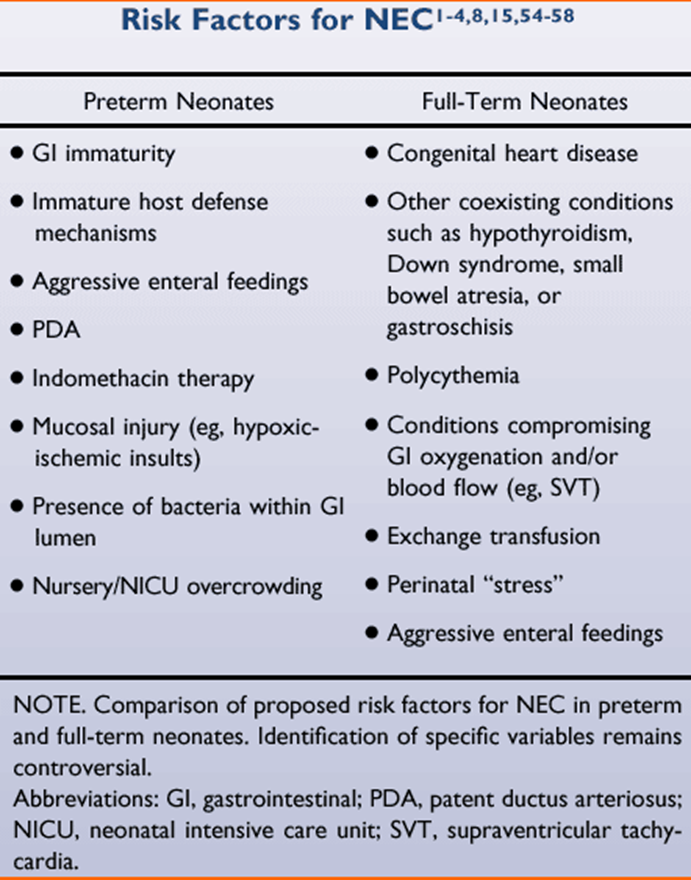A 30 weeks' gestation neonate born with low Apgar scores is in the neonatal intensive care unit with respiratory distress syndrome and underwent an exchange transfusion for anemia. Which factors place the neonate at risk for necrotizing enterocolitis? Select all that apply
hyperthermia
low Apgar scores
preterm birth
respiratory distress syndrome
exchange transfusion
hyperglycemia
Correct Answer : B,C,D,E
A. Hyperthermia is not typically associated with an increased risk of necrotizing enterocolitis.
B. Low Apgar scores indicate that the baby had difficulty adapting to life outside the womb and may have suffered from hypoxia or acidosis.
C. Preterm birth is a significant risk factor for necrotizing enterocolitis.
D. Respiratory distress syndrome is associated with prematurity and is a risk factor for necrotizing enterocolitis.
E. Exchange transfusion, a procedure often performed in neonates with severe jaundice or anemia, is associated with an increased risk of necrotizing enterocolitis.
F. Hyperglycemia is not typically associated with an increased risk of necrotizing enterocolitis.

Nursing Test Bank
Naxlex Comprehensive Predictor Exams
Related Questions
Correct Answer is A
Explanation
A. Presenting food matter-of-factly and allowing the child to choose what to eat can help promote autonomy and reduce mealtime stress, encouraging healthier eating habits over time.
B. Allowing the child to pick out foods for meals may reinforce picky eating habits and may not necessarily promote balanced nutrition.
C. Offering high-fat snacks to entice the child to eat may reinforce unhealthy eating habits and may not address the root causes of picky eating.
D. Offering a special treat as a reward for eating all the food on the plate may create an unhealthy association with food and may not promote long-term healthy eating habits.
Correct Answer is D
Explanation
A. While acknowledging the father's concerns is important, this response doesn't provide guidance on addressing potential depression in the son.
B. Offering to refer the son for evaluation with a therapist if mood issues are noticed is important and provides proactive support and guidance for addressing potential depression but screening children with a risk factor for depression from the age of 11 is the best choice.
C. While regular screening may be indicated for at-risk teens, waiting until age 14 may miss opportunities for early intervention in some cases.
D. Screening for depression is recommended for all children aged 11 and older, especially those who have a family history of depression or other risk factors. The nurse should inform the father that screening his son for depression is important and can help identify any signs or symptoms early. This is based on the recommendations of the American Academy of Pediatrics, which state that pediatric primary care providers should screen all children and adolescents for depression at least once a year, starting from age 11.
Whether you are a student looking to ace your exams or a practicing nurse seeking to enhance your expertise , our nursing education contents will empower you with the confidence and competence to make a difference in the lives of patients and become a respected leader in the healthcare field.
Visit Naxlex, invest in your future and unlock endless possibilities with our unparalleled nursing education contents today
Report Wrong Answer on the Current Question
Do you disagree with the answer? If yes, what is your expected answer? Explain.
Kindly be descriptive with the issue you are facing.
